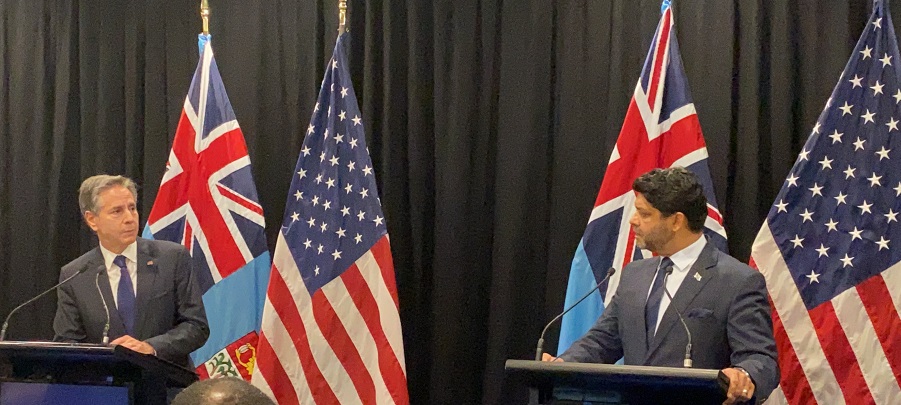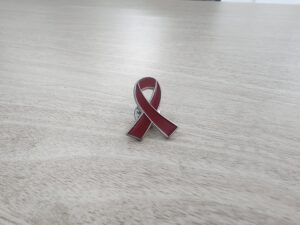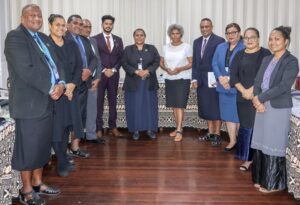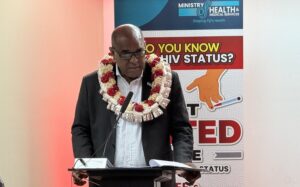Fiji’s Acting Prime Minister and Attorney-General Aiyaz Sayed-Khaiyum welcomed US’ renewed commitment to helping Pacific Island countries tackle challenges that threaten the livelihoods of Pacific Islanders, chief among these, the impacts of climate change.
During meetings with a Fijian Government delegation and a wider meeting of Pacific Island leaders, US Secretary of State Antony Blinken pledged to decarbonize operations within the State Department in addition to its net-zero commitment.
“The last significant American presence we felt in Fiji were soldiers we welcomed here during the Second World War. We face a new war today, a climate war that is devastating our people, unlike any conflict before it,” Sayed-Khaiyum said. “There is no region of the world, not in the Pacific, not in Europe, not in the Americas, that will be spared its consequences.”
“Fiji and America are both working to support a more secure, stable Indo-Pacific region, and indeed a peaceful region. There is far more we need to do together as partners in this battle of our lives. As a nation that shares many of our struggles and our values, America is uniquely positioned to be a direct partner to Fiji for peace and climate security not only across the Indo-Pacific but here in the blue Pacific.
“Fijians believe in leading by example as well, which is why, despite our emissions being negligible, we have committed to achieving net-zero by 2050. Mitigation and adaptation both require access to technology we do not have, and which major market powers like the USA can help us deploy, including (inaudible). And that means jobs for Fijians, jobs in cutting-edge technology and from nature, that both can build the future. And not only because America is a large emitter that it must cut its carbon emissions, but because it is an innovator that can create climate solutions. We need American might and its mind as well as pioneering solutions and investments here on the shores of this blue frontier.”

Sharing Fiji’s climate change struggles, Sayed-Khaiyum said 14 cyclones have struck the country since the Paris Agreement was signed, six communities have been moved to escape rising sea levels, and 14 others poised to. Diminishing reefs and erratic weather patterns have also threatened people’s livelihoods and ways of life. This week, Ba Town was flooded for the third time in three months.
“We, of course, aren’t alone: The Pacific Islands are sinking; Texas is freezing; California is burning, and New York is flooding. When a superstorm misses Fiji, American Samoa is in the crosshairs. And Hawaii, Guam, and FSM know many of Fiji’s struggles because they also live them.”
The discussion also touched on commitments to uphold the rule of law in the region, including the Law of Sea in line with efforts to sustainably manage and protect the ocean.
“We sought to jointly up our game through our navies, militaries, and our Fiji police force through maritime surveillance cooperation to end illegal fishing, combat transnational crime, and ensure that this is an ocean dedicated to exploration and discovery, not exploitation and destruction.
“In this respect, we also discussed the opportunities for greater participation from the USA in the Australian-funded Blackrock facility in Fiji to coordinate joint responses to the catastrophic events not just in Fiji but in the wider Pacific.”
Discussions also touched on Fiji’s vaccination roll-out and trade, exports, and collaboration in the service sector.
“We are also keen to open more of the U.S. export market to our farmers. We would love to export more of our kava (inaudible), as well as ginger, carob, turmeric, sugar, Fijian chocolates, cosmetics, and other Fijian-grown and Fijian-made products to the U.S. We also welcome U.S. firms looking to participate in our growing outsourcing services sector. We have young, well-spoken, English-speaking, tech-savvy, and, frankly, very friendly people who would love the opportunity.”
Sayed-Khaiyum said that Blinken’s visit underscored the importance of the Pacific region.









